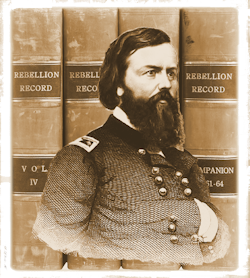February 17.—At Columbus, the Legislature of Ohio held a mass-meeting in the State House to rejoice over the recent victories of Forts Henry, Donelson, etc.
Gov. Tod was called to the chair; prayer was made by the venerable Dr. Hoge, amid the booming of cannon. Gov. Tod said:
“If there is a man in all the country that does not rejoice over the news of to-day, frown on him, brand him as a traitor. Is he in your churches? turn him out. Is he in your Assembly? put him out. Is he in your family? shut the door in his face. [Cheers.] We want it understood as the voice of this meeting, that the Government is to hang all guilty traitors; and that if England continues to threaten, we will next pay our respects to her.”
Speeches were also made by Mr. Thomas Ewing, Lieut.-Governor Stanton, Mr. Delano, Col. B. McCook, Messrs. Groesbeck, Fink, Monroe, Flagg and Galloway. Senators, Representatives, State officers and the people, had a refreshing season, and adjourned after three cheers for the Union.
—A battle took place at Sugar Creek, Arkansas, this day. The rebels were concealed in the woods on both sides of the road. The country was broken, hilly woodland. The First Missouri cavalry, while charging up the hill, were fired upon by the ambushed foe, concealed behind the trees.
After receiving a murderous fire, in which thirteen of the Nationals fell and five were wounded, the cavalry fell back and formed in line. Major Bowen came up and shelled the woods with his mountain howitzers. The enemy replied with their artillery. The latter ceased firing, and the National advance fell back to their camp. Major Bowen was wounded in the wrist. Capt. Switzer, of Wright’s battalion, Fourth cavalry, and Major T. C. McKinney, Assistant Adjutant-General, were among the wounded.—St. Louis Democrat.
—Gen. Huger, at Norfolk, Va., issued the following order this day: “Such portions of the militia as are called into service, in this Department, will report to the nearest confederate officer, and will be employed in defending their property and homes now threatened by the invader.
“They will obstruct the water-courses and roads by which the enemy may approach, and from the narrow banks of the rivers use their shot-guns on the ravagers. They will arrest all citizens who hold intercourse with the enemy.
“Let every man do his duty, and the destroyers will be driven from your country.”
—This day two regiments of rebel Tennesseans marched into Fort Donelson to reinforce it, being unaware of its capture. They went along with their colors flying and their bands playing, and were allowed to enter the camp without any warning as to the character of the possessors of it. They were all (one thousand four hundred and seventy) captured.—N. Y. Herald, March 1.







